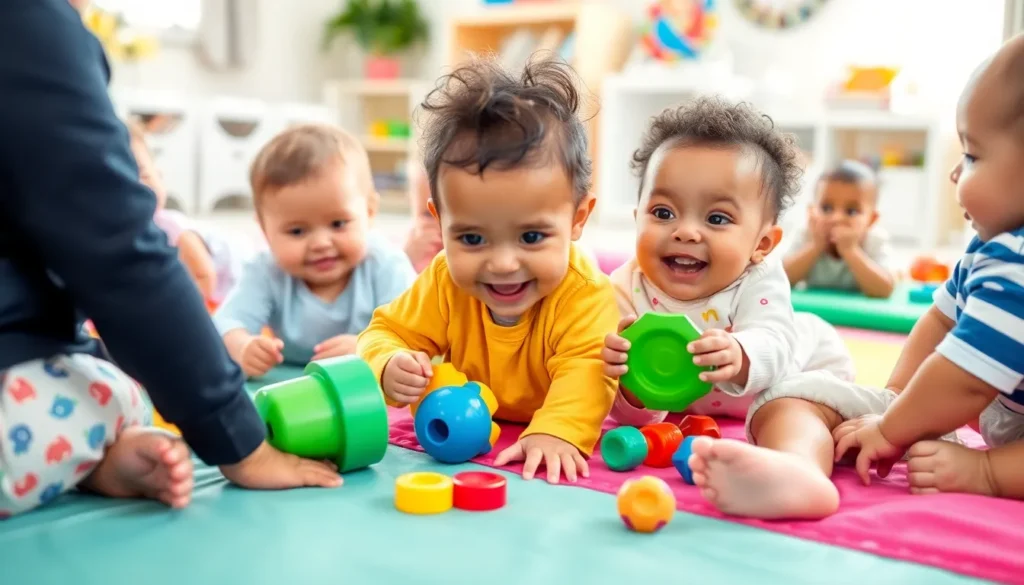From the moment a baby enters the world, their brain kicks into high gear, growing at a pace that would make even the fastest computer jealous. It’s a whirlwind of connections, synapses, and those adorable little giggles that light up a room. Understanding baby brain development isn’t just for neurobiologists; it’s crucial for parents, caregivers, and anyone who wants to help these tiny geniuses reach their full potential.
Table of Contents
ToggleUnderstanding Baby Brain Development
Understanding baby brain development is crucial for fostering a supportive environment for growth. This knowledge empowers parents and caregivers, enabling them to nurture and engage with infants effectively.
Importance of Early Brain Development
Early brain development shapes a child’s future learning and behavior. Connections among neurons form rapidly during this critical period. Experiences during the first three years significantly impact cognitive, emotional, and social skills. Enriched environments, filled with positive interactions, stimulate brain growth. A lack of stimulation may hinder potential development. Research shows that 90% of a child’s brain growth occurs by age five. Investing time in nurturing activities, such as reading and conversation, enhances cognitive outcomes.
Stages of Brain Growth
Stages of brain growth unfold in distinct phases. At birth, a baby’s brain contains approximately 100 billion neurons. During the first year, synapse formation occurs at an astonishing rate, forging essential connections. Between one and two years, brain development focuses on language acquisition and social skills. As children reach preschool age, the brain undergoes rapid maturation, enabling more complex thinking. Each stage builds upon the previous one, highlighting the significance of early experiences. Engaging in play, singing, and responsive communication supports healthy brain development throughout these stages.
Factors Influencing Baby Brain Development

Understanding the factors influencing baby brain development is essential. Both genetics and environment play crucial roles in shaping this process.
Genetics and Heredity
Genetic makeup sets the foundation for brain development. Each baby inherits genes from parents, influencing cognitive abilities and temperament. Specific genes contribute to neuronal growth, synapse formation, and overall brain architecture. Genetic predispositions can also affect susceptibility to developmental disorders. Research indicates that genes involved in brain development are intricately linked, meaning inherited traits can manifest as cognitive strengths or weaknesses.
Environment and Experiences
Environmental factors significantly impact brain development. A stimulating environment fosters cognitive growth through varied experiences. Exposure to language, nurturing interactions, and playful activities enhances neural connections. Safe and supportive surroundings allow babies to explore, leading to improved social and emotional skills. Additionally, consistent, responsive caregiving has been shown to buffer against adverse effects of stress, promoting a healthy brain development trajectory. Engaging in early learning activities helps babies achieve better long-term outcomes, underscoring the importance of a rich environment.
Key Milestones in Baby Brain Development
Understanding key milestones enhances awareness of baby brain development. These milestones divide into cognitive growth as well as emotional and social development.
Cognitive Milestones
Cognitive milestones reflect significant brain advancements. By six months, infants exhibit improved attention spans. They begin recognizing familiar faces and objects. Around nine months, babies demonstrate problem-solving skills, actively exploring their environment. Language recognition and early verbal attempts emerge between 10 to 12 months. Babies often say their first words around this stage. Rapid synapse formation significantly supports these cognitive achievements. Engaging in activities like reading, singing, and playing boosts these critical developmental milestones and fosters essential learning pathways.
Emotional and Social Development
Emotional and social milestones start as early as birth, with secure attachment forming between caregivers and infants. By three months, babies express joy through smiles and laughter. Around this time, they begin recognizing emotional cues from caregivers as well. By six months, they show clear preferences for familiar people. Social interactions become vital, promoting empathy and communication skills. Between eight to 12 months, early social skills emerge, including sharing and turn-taking. Ultimately, nurturing interactions lay a strong foundation for emotional health and robust social engagement later in life.
Supporting Healthy Brain Development
Nurturing brain development in babies lays the foundation for future learning and behavior. Parents and caregivers play a critical role in this process.
Nutrition and Feeding
Nutrition directly influences brain growth and function. Breastfeeding offers optimal nutrients, promoting cognitive and emotional development. When breastfeeding isn’t possible, high-quality infant formulas provide essential vitamins and fats. Introducing a variety of solid foods after six months encourages sensory exploration and skills. Nutrients like omega-3 fatty acids, iron, and zinc are crucial for brain health. For instance, fatty fish, leafy greens, and lean meats contribute to ongoing growth and development. These dietary choices shape neural pathways and enhance learning potential.
Stimulating Activities and Interactions
Engaging in stimulating activities fosters healthy brain development. Interactive playtime encourages cognitive engagement while enhancing problem-solving skills. Reading aloud to infants nurtures language acquisition and fosters connection. Providing toys that promote exploration and creativity sparks curiosity and supports fine motor skills. Regularly conversing with babies allows them to learn emotional cues and social interaction. By consistently reinforcing these activities, caregivers create an enriched environment that encourages optimal development. Rich interactions during playtime and conversations build a strong foundation for future social skills and emotional health.
Understanding baby brain development is vital for fostering a nurturing environment that promotes optimal growth. Parents and caregivers play a crucial role in this journey by engaging in activities that stimulate cognitive and emotional skills. By recognizing the significance of early interactions and providing a rich, supportive atmosphere, they can help shape a child’s future learning and behavior.
Investing time in reading, conversing, and playing with infants not only enhances their brain development but also strengthens the bond between caregiver and child. As babies grow, their experiences and relationships will lay the groundwork for their social and emotional well-being. Prioritizing these early developmental stages is essential for ensuring a bright future for every child.




